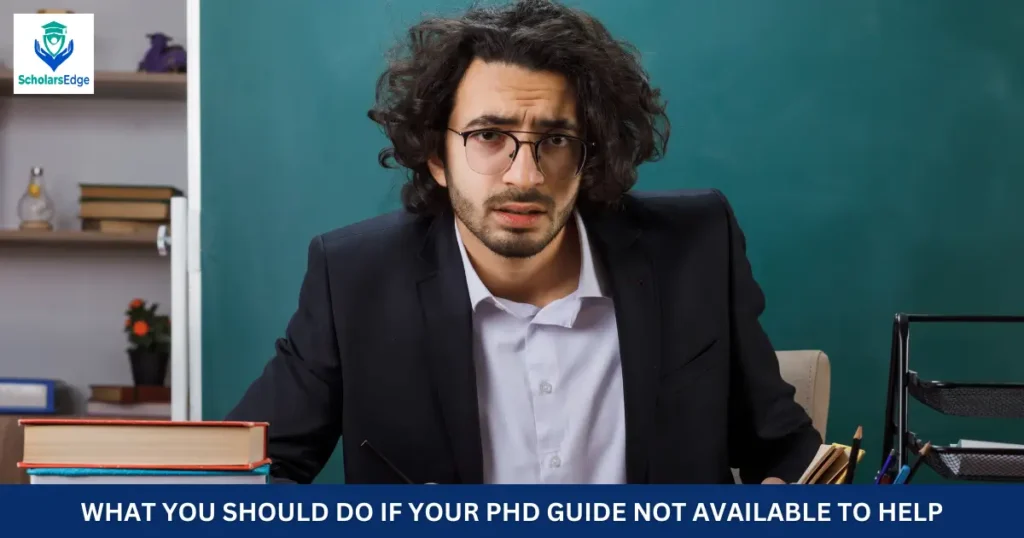
Are you searching for information about a Ph.D. guide that is unavailable to help you with your research and many other things? If your answer is yes, you are in the right article. I have covered every known information about Ph.D. guides that are unavailable to help you with your research and many other things. So continue reading to learn What you should do when your PhD guide not available to help.
Signs That Your Ph.D. Guide Not Willing To Help
As a Ph.D. scholar, you should always recognize your guide before it’s too late. During a Ph.D., the supervisor plays a really important role. If your supervisor does not provide guidance and support as per your requirements, you might face a lot of problems in your Ph.D.
Lack Of Communication Or Delayed Responses
It means that your guide never talks to you properly about your research topic. They are not giving a proper response to you and your questions. This is a common sign that your guide is unwilling to help you.
Disinterest In Your Research Topic
This means that the guide doesn’t properly check your research and find all the mistakes you made, and he doesn’t explain them. You should know about them.
Failure To Provide Feedback Or Guidance
This means your supervisor never comments on your research work and research process. And they never give you proper guidance. So, you should find a supervisor who can provide you with feedback.
Unwillingness To Allocate Time For Meetings Or Discussions
This means your guide is not willing to set a proper time for your research project. If your guide cannot manage any time for meetings, you should change your guide immediately.
How To Avoid Ph.D Guide Problems?
There are many ways to avoid this problem, but I have covered the most effective ways to get guidance during a PhD. The steps are as follows:
Clearly Defining Expectations And Goals Early On
It means that your guide meets your expectations by describing your mistake and providing information about how you can improve it and what your mistakes are.
Regularly Communicating Your Progress And Seeking Feedback
This is the most important thing we all need as researchers from the guide. This helps to improve your mistakes, and this helps to teach you many new things. A progressive guide will always give feedback on your mistakes and tell you what to improve and what not to improve.
Building A Strong Relationship And Maintaining Open Communication
As a PhD research scholar, you should have a strong relationship with your guide, and you should always try to maintain it. And you should always be connected with your guide, who helps you in your research journey.
Seeking Support From Other Faculty Members Or Mentors If Needed
This is an advantageous point; you should always stay in contact with a guide. It will help you improve your mistakes and learn many more things. About other things also.
Conclusion
Facing an unsupportive PhD guide is challenging, yet it highlights the importance of self-reliance and proactive engagement in your research journey. The key to crossing this situation is seeking alternative mentorship within the program and developing connections with peers and other faculty members. Accepting independence in learning and research while maintaining open communication and seeking feedback is crucial. This approach not only aids in overcoming immediate obstacles but also prepares you for a future academic career. The responsibility for a successful PhD rests with the scholar, emphasizing the need for resilience, adaptability, and a focus on personal and professional growth in the face of adversity.
FAQ on PhD Guide Not Available To Help
How to deal with a bad PhD supervisor?
If you are facing challenges with a bad Ph.D. guide, then it’s better to discuss it respectfully with your guide to improve himself or herself. If he accepts it and starts to teach you well, it’s good. But if it’s not working, it’s better to ask your Head of Department about the issue. Remember, changing them may take time, so give them a chance.
What should you do if your PhD advisor leaves?
If your Ph.D. guide unexpectedly leaves, you should request a new guide from your head of department. You should also try to learn from your seniors and peers of other faculty. If this still doesn’t work, seek help from the internet.
How do you deal with a toxic PhD guide?
Dealing with a toxic Ph.D. guide can be challenging, but improving your knowledge is essential. It is better to discuss this with your friends and seniors and raise the issues about the guide with your head of department. They will help to improve the guide’s behavior.
How do you deal with a nonresponsive PhD supervisor?
Dealing with a nonresponsive PhD supervisor requires a proactive approach. First, attempt to establish clear communication channels and regular meeting schedules. If unresponsive behavior persists, seek guidance from other faculty members or a departmental advisor. Additionally, consider forming a support network with peers for advice and encouragement. Document all attempts at communication for reference. If the situation doesn’t improve, explore the possibility of changing supervisors within your program.
